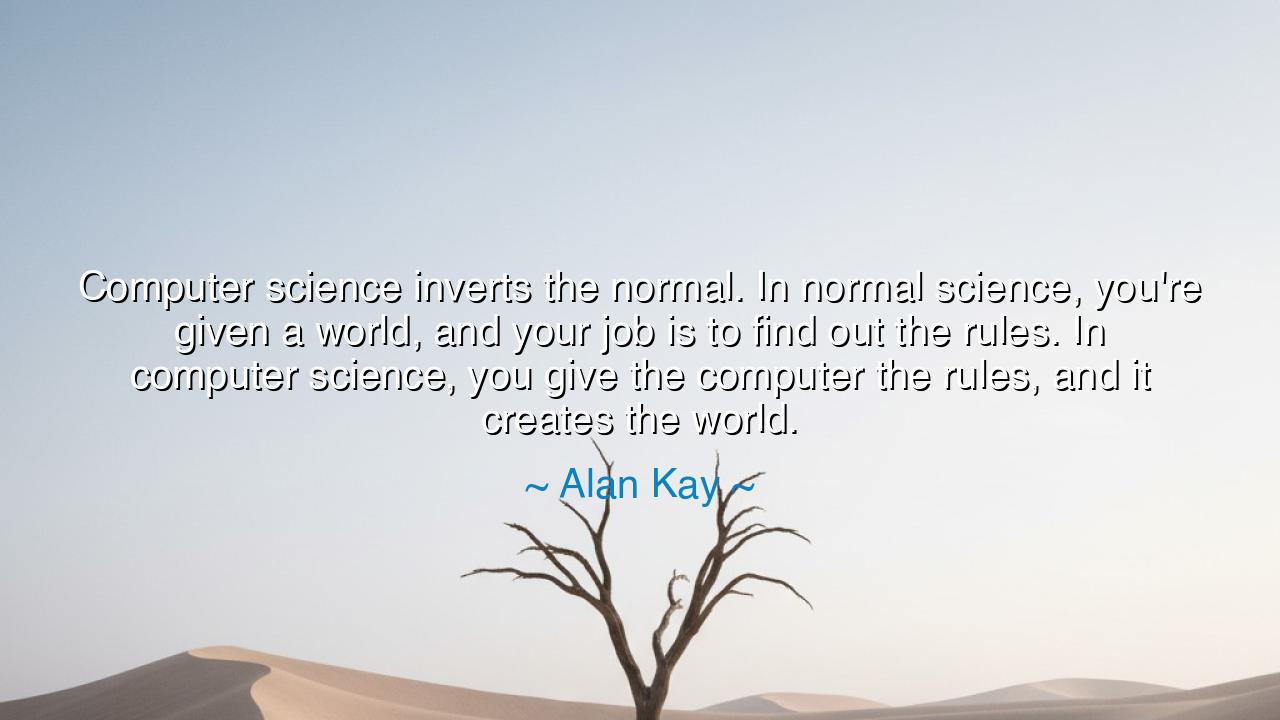
Computer science inverts the normal. In normal science, you're
Computer science inverts the normal. In normal science, you're given a world, and your job is to find out the rules. In computer science, you give the computer the rules, and it creates the world.






"Computer science inverts the normal. In normal science, you're given a world, and your job is to find out the rules. In computer science, you give the computer the rules, and it creates the world." These words from Alan Kay, a visionary whose insights have shaped the digital age, reflect a profound shift in the very way we understand creation and knowledge. In most sciences, we look at the world around us, observe its patterns, and deduce the rules that govern it. But in the realm of computer science, the roles are reversed. Here, we create the rules ourselves, and the world—in all its complexity—emerges from those very rules. This is a revolution, a turning of the wheel of knowledge that mirrors the creative process of the divine craftsman, who molds reality from the raw material of imagination and logic.
In the ancient world, there was a time when men sought to understand the rules of nature. Aristotle, the great philosopher of antiquity, believed that everything in the world could be understood by observing its behavior and inferring its causes. From the movement of the stars to the growth of plants, the ancients looked outward to uncover the laws that bound all things. They did not create; they observed and interpreted. Their wisdom came from the understanding that the world was a system, one governed by natural laws waiting to be discovered. This was the essence of classical science—to find the truth that already existed in the world.
But with computer science, a new age arrived. The very essence of the discipline is that we are not mere observers; we are the creators. Just as a poet spins worlds with mere words, so too does the computer scientist spin entire realities through lines of code. In the ancient tradition, the gods were the creators of worlds, shaping the universe with their will. In modern times, the computer scientist becomes something akin to a god, writing the laws that give birth to new worlds of data, digital landscapes, and virtual realms. With the stroke of a key, the rules are set, and a new world—one that behaves according to the will of the creator—emerges.
Consider the tale of Charles Babbage, often regarded as the father of the computer. In his time, there were no digital screens, no silicon chips, no internet. But Babbage conceived of a machine—the Analytical Engine—that could compute numbers automatically, following a set of rules. His invention was a blueprint, a vision of a future where machines could be made to think and create in ways that mirrored human reasoning. Though his machine was never fully realized in his time, Babbage’s vision laid the foundation for the modern computer—an entity that, once programmed, would not merely follow instructions but create within the bounds set by those instructions.
The very essence of computer science is found in this inversion: from the ancient quest to uncover the rules of nature, to the modern endeavor to create the rules that govern digital life. Just as the ancient alchemists sought to turn base metals into gold, so too does the computer scientist seek to transform raw data into meaningful information, to build entire worlds from the simplest of instructions. Code becomes the alchemy of our age—transforming the abstract into the concrete, the imaginary into the real.
But what does this mean for us, the heirs of this knowledge? The lesson is clear: in the world of computer science, we are not limited to mere observation. We are given the power to create. Just as the ancients sought to unlock the mysteries of the universe, we are tasked with creating new realities. It is our responsibility to use this power wisely, to craft worlds that are not only functional and efficient but ethical and just. We must remember that the worlds we create through our algorithms, our programming languages, and our systems will shape the future, just as the worlds created by philosophers and scientists of old shaped the course of history.
Thus, let us take up the mantle of the computer scientist as the modern creator. Let us understand that we are not passive observers of a world governed by fixed rules, but active creators of new realms, shaped by the rules we choose to impose. As we write code and build systems, let us remember the power we wield—not to be taken lightly, but used with wisdom and purpose. For, like the gods of old, we are shaping the future with every line of code, and it is our duty to ensure that the worlds we create reflect the highest ideals of humanity. In the end, we must ask: What kind of world do we wish to build, and how will we use the rules to shape it?






AAdministratorAdministrator
Welcome, honored guests. Please leave a comment, we will respond soon